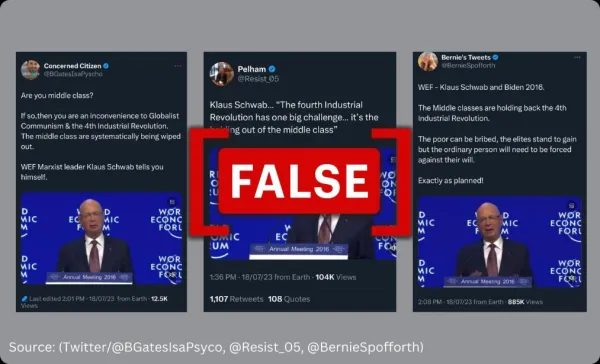By: Toibah Kirmani
July 20 2023

Schwab didn't blame the middle class, he emphasized the need to save the middle-class amid the Fourth Industrial Revolution.
Context
A short video clip featuring Klaus Schwab, the founder of the WEF (World Economic Forum), has gone viral on social media. Some are interpreting his statements as suggesting that the middle class is hindering the progress of the Fourth Industrial Revolution, while others say that there is a deliberate agenda to eliminate the middle class altogether. One Twitter user with 235.2K followers shared this video with the caption, “WEF - Klaus Schwab and Biden 2016. The Middle classes are holding back the 4th Industrial Revolution. The poor can be bribed, the elites stand to gain but the ordinary person will need to be forced against their will. Exactly as planned!” This tweet has garnered 885,000 views and more than 9,000 retweets. Archived versions of such posts can be found here, here and here.
However, Schwab never said this.
In Fact
We researched the WEF Annual meeting in 2016, and found several videos featuring different world leaders addressing various topics on the occasion. One video posted on the official YouTube channel of the World Economic Forum on January 21, 2016, contains the moment in question, at the timestamp 2:20. Here, Klaus Schwab, while inviting Joe Biden, then Vice President of the United States, to the stage states, "The fourth industrial revolution has one big challenge, and it is hollowing out the middle class—a crucial part of our democracies." It is to be noted that he says "hollowing out" instead of "holding back."
This statement was made in the context of his book "The Fourth Industrial Revolution," in which Klaus outlines key technologies driving this revolution and discusses the major impacts expected on government, business, civil society, and individuals. Additionally, the theme of the 46th World Economic Forum Annual Meeting held in Davos-Klosters, Switzerland, from January 20 to 23, 2016, was "Mastering the Fourth Industrial Revolution.”
Biden addressed the event, saying: “The [Fourth Industrial] Revolution has the potential to further hollow out the middle class. It is our responsibility to bend these changes to the benefit of society – to make sure that the digital revolution creates more winners than losers.”
The WEF followed up with an article about Biden's speech on their official website, titled "Biden: In the Face of Perils of Fourth Industrial Revolution, Give Middle Class 'Possibilities'" on January 20, 2016, further emphasizing the focus on safeguarding the middle class. Deutsche Welle (DW) reported two days before the 2016 Davos meeting that the revolution is expected to bring significant changes to businesses and job markets in the next five years, as stated by The World Economic Forum in their study.
WEF, its founder Klaus Schwab, and many other influential individuals who support the forum's initiatives have long been targets of conspiracy theorists. Some of these conspiracy theories, like The Great Reset and The New World Order, portray these people as an elite class with a sinister plot to control the world by enslaving the global populace. Logically Facts and other independent fact-checkers have debunked these conspiracy theories.
The Verdict
WEF founder Klaus Schwab did not say the middle class is “holding back” the Fourth Industrial Revolution. Instead, he discussed the potential of the revolution to “hollow out the middle class” and emphasized the need to protect and benefit society during this period. Hence, we have marked this claim as false.